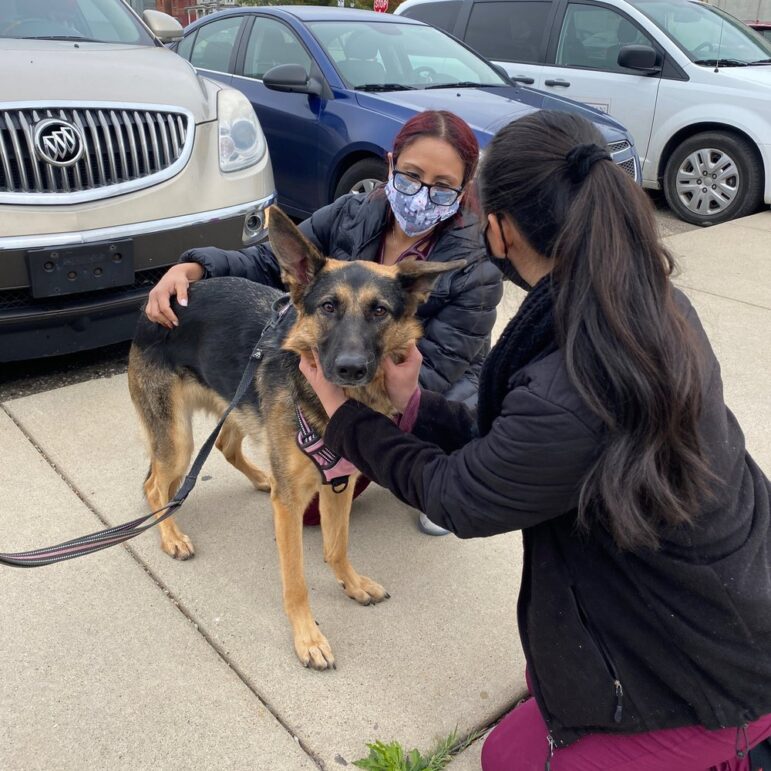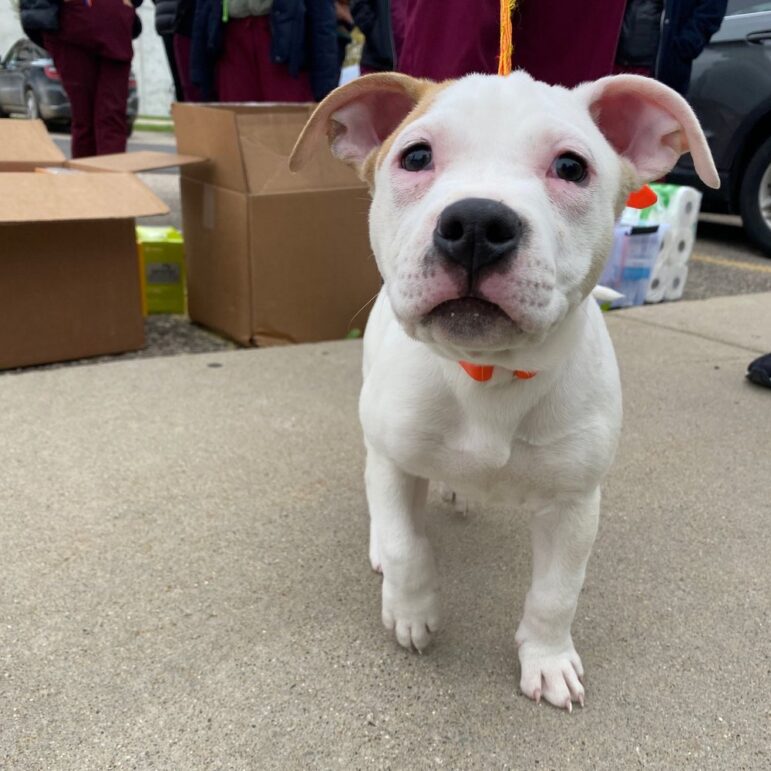
Street Dog Coalition
German shepherd at a mobile clinic in Detroit. Nonprofits say they hope to step up help for pets of unsheltered peopleBy VLADISLAVA SUKHANOVSKAYA
Capital News Service
LANSING – Requests for help for pets of homeless people are rising compared to the previous year and nonprofits hope to help
The Humane Society of Huron Valley in Ann Arbor plans to launch a low-cost and free mobile clinic for people who can’t afford veterinary care for their pets, said clinic director Gary Evans.
Evans talked about an elderly man with an American flag whom he saw every day on the way to work with his old Pomeranian – “a pair that’s been together for quite some time and have quite a deep bond.”
The person was collecting money next to a highway ramp and one day popped up in Evan’s clinic.
“He told everybody about his dog. He clearly loves his dog because he’s literally always there next to him on the side of the ramp.”
Evans continued, “We were able to provide some help. And I get a very happy wave now whenever I see him, so it’s just one of those small world kind of connections that were not only helping somebody in need, but was very personal because it was somebody I don’t know at all, but see five days a week.”
The Humane Society of Huron Valley is one of the largest shelters for pets in Michigan and operates in Washtenaw County.
It provides free and low-cost veterinarian care. It plans in the next year to expand help for homeless people and reach them with mobile clinics, communications director Wendy Welch said.
Additionally, the organization wants to distribute free jackets as colder weather is here.
“I ran into one gentleman who was living in a tent just outside a homeless shelter with a large breed dog that had short fur,” said Cameron Greig, the manager of the organization’s Bountiful Bowls pet food assistance program.
“For a dog like that, any type of fleece jacket blanket is helpful. And I’d like to develop a little bit of a stockpile for when those situations arise,” Greig said.
People who experience homelessness can’t simply take pets with them and live in a shelter because only service animals are generally allowed.
Daniel Kelly, the director of the Shelter Association of Washtenaw County, told about a homeless veteran in a wheelchair who had been staying with a service dog.
He said, “The dog was often working, so you couldn’t pet him. But it was a pretty warm experience. We all enjoyed that. And it was exciting.”
Kelly added, “He moved into his own permanent home a few months ago with his dog and got a little pet bed and everything.”
“I haven’t seen him since, which is usually a good sign. If we don’t see a person anymore, it usually means they’re doing well,” he said.
Shelters’ main challenge is limited space, and that’s why they can’t accommodate pets.
“I would love to have a better solution,” Kelly said. “But it comes down to capacity.
“When you compare that to, like, can we bring somebody in who’s being discharged from the hospital, who needs help with their leg being amputated, do we have the medical staff necessary to meet that person’s need?
“I hate to say it, but we prioritize that over whether someone can bring their pet in,” he said.
The Street Dog Coalition, based in Colorado, operates in 50 cities, including Detroit, Chicago and Minneapolis.
Executive director Katrina Weschler said the coalition has local branches that open a free veterinary clinic at least four times a year to make sure patients get a follow-up. Some clinics operate monthly.
Street clinics pop up in homeless day shelters, parking lots, parks, church basements and homeless encampments.
In the Great Lakes area, the coalition helped more than 355 people and 500 pets in 2022, according to its statistics.
“There is definitely a rise in the number of requests for help compared to previous years, especially since the pandemic,” Weschler said.
Vladislava Sukhanovskaya reports for Great Lakes Echo.

Street Dog Coalition
Pit bull at a mobile clinic in Detroit.